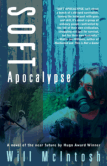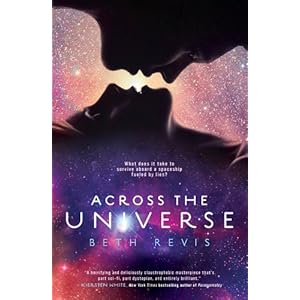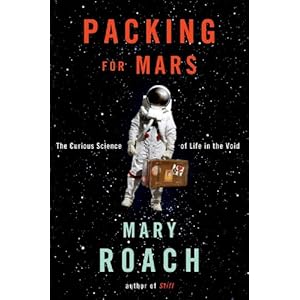Mike’s favorite books of 2013
Following the tradition I started in 2009, and continued in 2010, 2011 and 2012 I present my annual list of my favorite books I read during the past year. As always, the lists tends towards history, science, and speculative fiction, but hey, it’s my list, so without further ado, and in no particular order…

The Abominable: A Novel by Dan Simmons
This novel starts out slow, and turns into an absolutely intense fight for survival in a harsh environment with stakes as high as they get. The attention to historic detail and the minutiae of 1920s mountain-climbing tech is fascinating.

One Summer: America, 1927 by Bill Bryson
Bryson could write about watching grass grow and it would be fun. He has much more interesting material here, chronicling one summer in American life, using as his hook Lindbergh’s famous flight. A remarkable look at pop-culture history.

On the Steel Breeze by Alastair Reynolds
The best writer in science fiction today hits another out of the park with “Steel Breeze,” a story that combines a fight for survival on a massive generational starship, an encounter with a mysterious alien machine intelligence, and the politics of a world where human nature has been changed (or has it?) due to the influence of advanced software.

Year Zero: A History of 1945 by Ian Buruma
A refreshing and entirely new take on World War II, focusing not on the fighting itself, but what happened during the first year after. Of particular note, the author covers the entire world, Asia and Europe, focusing on the themes of vengeance, re-establishment of the rule of law, and the politics and implementation of the occupations.

Doctor Sleep: A Novel by Stephen King
The sequel to “Shining” is much less ‘horror’ then the original (although some old friends do make appearances) and more meditative. This is King, though, and he doesn’t skimp on the plot development or strong characters. A fun read with color villains and great heroes.

Command and Control: Nuclear Weapons, the Damascus Accident, and the Illusion of Safety by Eric Schlosser
Investigative journalist Schlosser (“Fast Food Nation”) digs into one of the biggest secrets of the atomic age: namely that our weapons were stored and controlled with less attention to security and detail then the average person’s LinkedIn password. An essential history of how we managed these weapons is told through the story of a near-disaster in an Arkansas silo where a nuclear weapon came close to accidental detonation on American soil.

More Than This by Patrick Ness
A teenage boy wakes up alone in a world that is empty and decayed, with no memory of how he got there. This is the hook for a mystery that extends very deeply into the nature of reality, linked to traumatic events in the boy’s family past as he discovers who he is. One of the most unique and fresh takes on this genre in years.

Odds Against Tomorrow: A Novel by Nathaniel Rich
Cross Nate Silver with Rick Grimes, and you might have the protagonist in this literate post-apocalyptic novel. The protagonist is a conflicted math whiz who uses his predictive skill to make himself rich forecasting disasters for insurance companies and other wealthy clients, becoming numb to the world, until he and the woman he cares about experience an apocalypse he himself predicted.

The Skies Belong to Us: Love and Terror in the Golden Age of Hijacking by Brendan I. Koerner
Ostensibly the story of one of two drug-addled screwballs who managed an audacious hijacking in the early 1970s, Koerner’s book more broadly focuses on a history of the so-called “golden age” of hijacking, in the late 60s and early 70s, the age before metal detectors and when hijackers were generally non-violent. Both a history of the hijackers themselves and the story of how the system tried to respond, the book really brings alive that crazy, amazingly innocent (compared to now) era.

Fiend: A Novel by Peter Stenson
The premise is simple. The zombie apocalypse happens, and the only folks who are immune are meth addicts, and only if they remain addicted (sobriety means a quick death and turning into a zombie). A mix of delicious zombie gore and musings on the nature of society and addiction, this novel is both comic and touching.

Ninety Percent of Everything: Inside Shipping, the Invisible Industry That Puts Clothes on Your Back, Gas in Your Car, and Food on Your Plate by Rose George
Look around; almost everything in your home or office got there because it travelled on a giant boat from somewhere else. Author Rose George climbs aboard the merchant marine and through her journey throws some light upon this little-known but essential piece of our world’s infrastructure, covering shipboard life, pirates, cargo handling, the the experiences of sailors and captains as they keep the flow of world commerce going.

Lincoln’s Code: The Laws of War in American History by John Fabian Witt
War is horrible, but it has rules, right? How these rules developed is a little-known story, featuring a very well-known President. Mixing military history, legal theory, and politics, author Witt tells the story about how fallible men tried to make what is essentially an inhumane activity as “humane” as possible.

The Time Traveler’s Guide to Elizabethan England by Ian Mortimer
There are many histories of Elizabethan England, and most of them cover the the lives of the powerful, and a certain well-known playwright, but what was it like to actually live then? How would you go about daily life, what would actually make you laugh or cry, what might you do to fill your plate and where might you go to shit it out? This is history made real, and short of a time machine, the closest we’ll come to really feeling what it might be like to experience another time.

To Save Everything, Click Here: The Folly of Technological Solutionism by Evgeny Morozov
In recent years there has been a lot of hype about how technology will finally be able to solve various problems that have been plaguing humanity. While no luddite, Evgeny Morozov takes a much needed pin to these balloons of hot air, explaining that technology is not a panacea and by itself cannot fix problems that at their root are not solvable via purely technical means. Sharp and witty, but backed by real thought and depth, this is some of the best writing on this issue I have seen in years.

The Faithful Executioner: Life and Death, Honor and Shame in the Turbulent Sixteenth Century by Joel F. Harrington
Using the little-known diary of a German executioner as its primary source, the lives of 16th century Germans and their notions of law and justice are examined. This book is fascinating, because for the vast gulf of time, and major changes in legal concepts and morality since then, the humanity of the titular executioner and the people he served have stayed surprisingly constant over time. History at its most interesting.

The Rule of the Clan: What an Ancient Form of Social Organization Reveals About the Future of Individual Freedom by Mark S. Weiner
There’s a fundamental difference between two different systems for organizing political life – tribal rule, and rule of law; the latter seems self-evidently much better, but there are strong pulls in human psychology towards the former. A fascinating look at the strengths and weaknesses of both systems, and how they can explain a lot of what we see in the world today; probably the best popular political philosophy book I’ve read in years.

The Fall of the House of Dixie: The Civil War and the Social Revolution That Transformed the South by Bruce Levine
That the South lost the Civil War is obvious, but less obvious is the very specific ways that the Southern “system” was dismantled, socially and politically. Looking at both the debate in the North and the facts on the ground in the South, author Levine brings this turbulent era to life on both sides.

The Secret Lives of Sports Fans by Eric Simons
I am a pretty dedicated fan of the Kansas Jayhawks basketball team, and my euphoria when they win big and despair when they lose has always tickled my intellectual side – why do I feel this way, how does it affect me psychologically and socially, and is it similar to other “mass euphoria” like religion? This wonderful book demonstrates experimentally some of the deep truths about sports fandom and the inner lives of fans.

Gulp: Adventures on the Alimentary Canal by Mary Roach
Mary Roach is one of the most entertaining science writes out there, and she doesn’t disappoint with this delightful trip down the digestive tract, from the mouth to the, uh, other end. It is rare to find an author who combines the childish fun of a fart joke with some interesting and genuine science, a real winner.

The Age of Miracles: A Novel by Karen Thompson Walker
A simple premise – the Earth starts rotating slower, the days start gradually getting longer. In “Age of Miracles” we see how this affects the world, through the eyes of a teenager girl with the usual joys and terrors of adolescence. The changes causes by the slowdown are well thought out and scary. Amongst the best speculative fiction novels I have read in a while.

Paleofantasy: What Evolution Really Tells Us about Sex, Diet, and How We Live by Marlene Zuk
As someone who is quite sick of pop-evolutionary psychologists saying that we do X or Y because the “cavemen” evolved to do it, or that we should eat this or that for the same reason, this book is a breath of fresh air. Zuk uses real science to show us how evolution really worked on human beings and separates the paleo hype from scientific fact in an engaging and informative style.

Exploding the Phone: The Untold Story of the Teenagers and Outlaws who Hacked Ma Bell by Phil Lapsley
Phone Phreaks were the original hackers, and their story has never been told with as much verve as here. Combining an interesting technical history of the phone system in America with the personal stories of some of the most colorful hackers who explored the system, this book takes us to a more innocent time. The cat and mouse tales practically leap off the page; a real celebration of the spirit of learning and exploring that marks true hacker culture.

The Disaster Diaries: How I Learned to Stop Worrying and Love the Apocalypse by Sam Sheridan
Zombies, meteors, bird flu, alien invasions or whatnot, what would it actually take to survive? Sam Sheridan explores this, taking on the role of an ordinary schlub who decides to learn all the skills of apocalyptic living, ranging from extreme driving, tactical weapons, food preparation, and combat first aid. This is a fun and interesting book, it’s not a boring survival manual – the author’s sense of humor comes through as he concocts ridiculous scenarios but then learns what real-world skills might come in handy.

The Reach of Rome by Alberto Angela
This might be considered the Roman equivalent of “The Time Traveler’s Guide to Elizabethan England” noted above; both books do an amazing job of really giving the reader a feel for life in the past. Where this book differs is that it covers the Roman world more broadly, following the movement of a coin around the Empire, touching on dozens of different people as they go about their lives. It reads like fiction, although everything in the book is based on actual archeology. An amazing trip through time; a day at the chariot races, a trip to a garum factory and a visit to a doctor’s office…real life in the Roman world from patricians down to slaves.

Moral Tribes: Emotion, Reason, and the Gap Between Us and Them by Joshua Greene
If psychology and philosophy had a baby, it would be this book. A great exploration of how humans make moral decisions and how these decisions inform our political and social choices, Greene ends up with a full-throated defense of a form of utilitarianism as the best way for groups of people with different moral views to live in peace.









